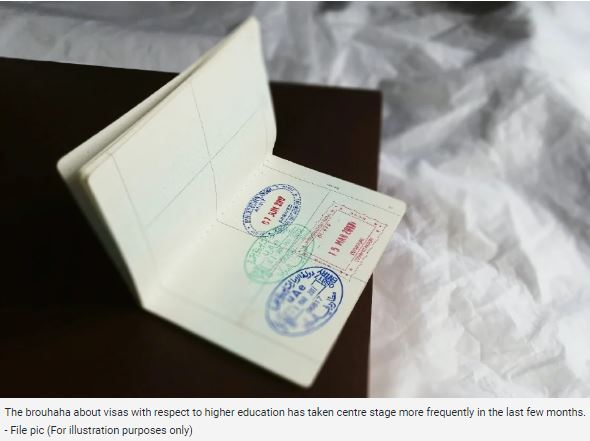Do better to realise the nation's dream of becoming an education hub
Emeritus Professor Tan Sri Dato' Dzulkifli Abdul Razak
Opinion - New Straits Times
August 23, 2022
THE brouhaha about visas with respect to higher education has taken centre stage more frequently in the last few months.
Though it has always been an issue of concern affecting the higher education sector in general, the pandemic has pushed the panic button among those who were made more insecure by the spread of the virus.
This has led to various restrictions being imposed on students who "overstayed" or having them categorised as "illegal immigrants".
While this used to be under wraps, pressure is currently mounting, what is more with new policies being introduced or tightened by the authorities in a sometimes flip-flop fashion that only adds to the confusion and leads to finger-pointing and blame games.
Given the power divide that exists between the parties involved, it is not surprising that all hell broke loose, with half-truths and one-sided media reporting adding fuel to the fire.
That it was allowed to happen at all is most unfortunate if the intention is to go big on the creating an education hub through "internationalisation" of foreign students.
Central to this is the visa issue!
This writer recalls better days without as much harassment while helming another public university back then.
Obtaining visas was very decentralised then, and collegiality, as well as strong rapport existed between university officials and the officials of the local agencies involved.
Understandably, the number of international students was relatively smaller then and communications were better handled.
So too, were the processes agreed upon which were well-understood by all parties.
This resulted in more amicable decisions according to the timeline specified.
This was no surprise since passports could be obtained within a very impressive time of about a week.
The issuance of visas followed suit, within an equally impressive time range, at the same time involving the same agency and officials.
That this is no longer the case, by and large, is regrettable.
Where has it gone wrong, and what can we (re)learn from the past?
The issuance of visas, for all intents and purposes, can be regarded as a vital gesture that facilitates the intake of potential students in the most welcoming manner possible.
More so when there is more than one party involved, with innumerable possibilities of things going wrong in the context of intercultural (mis)understanding.
It only means that the building of trust and relationships must be the utmost priority. Otherwise, potential students are the ones likely to lose, being at the receiving end in most cases.
Like in all public relations exercises, the sensitivities and risks are high. Nothing, therefore, should be left to chance.
This is the vital lesson that must be learned.
Perhaps an instructive lesson is to emulate the "Ease of doing business" (EODB) initiative that was mooted to ensure that the economic goals desired by
a country are easily accomplished.
Malaysia, in this regard, was able to claw into the top 20 position worldwide.
According to the World Bank Report 2020, Malaysia was ranked 12th, categorised as "very easy", up from 23 in 2010.
This is the outcome of a concerted effort, whereby the appropriate adjustments were studied and rectified in order to attract more investments.
Among others, it boasts business-friendly regulations, attractive tax incentives, low start-up costs and rapid governmental approvals to start a business.
These showcase the peaceful and safe environment that Malaysia is well-known for.
So, can we suggest an initiative called "Ease of Visa Issuance" to mirror the success of EODB?
We do not have to wait for a decade to make the quantum leap, because many of the barriers are structural issues that are man-made!
We must do better if the notion of an education hub through internationalisation is to be realised.
The writer, an NST columnist for more than 20 years, is International Islamic University Malaysia rector

